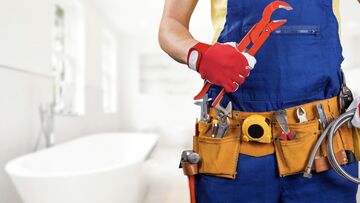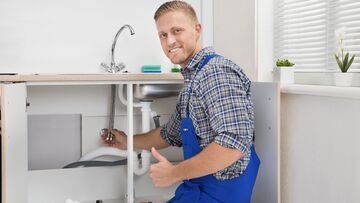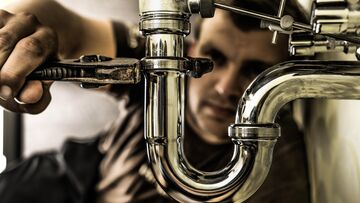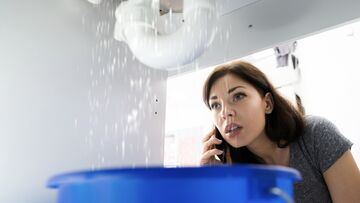Plumbers 06 June, 2023
How Much Does A Plumber Cost

Whether you have a leaking pipe or want to fit a new bathroom, you're going to need a qualified plumber to help you out. But how much does a plumber cost? And what can most plumbers charge for different services? This guide will help you to understand how much plumbers cost and what you can expect to pay for different services.
How Do I Know If Hiring a Plumber Is Right For Me?
If you have an issue with your plumbing or central heating system, it's a good idea to call in a professional plumber to fix it. There is a high risk of damage to your property if you try to tackle a plumbing project on your own.
While you might be able to get away with tightening up a loose tap or changing a washer, more complex jobs should always be left to the professionals. And if you aren't sure what the problem is, you're going to need to bring in a professional plumber to diagnose the issue.
Before you call out a plumber, you might be wondering about common plumbing costs and what you can expect to pay for popular plumbing jobs. We'll also share our tips to help you save money on your next plumbing job by seeking out the right plumbing and heating contractors.
Related Article: Need To Know How To Find Plumber?

Plumbing Costs Estimates: From an Install to a Pipe Repair
The cost of your plumbing job will all depend on the extend of the work, how long it takes and the material costs. You can expect to pay a call out fee and then either a fixed fee for whole job, or a per hour fee plus the cost of materials.
You can also expect to pay extra depending on where you are. Those living in the centre of London will pay more than those living in Northern towns like Lancaster. And you can also expect the final cost to be more if access to your property or plumbing is more difficult.
For a large job, it's best to ask for a fixed fee to help avoid spiralling costs if the job takes longer than expected. For smaller jobs, you might ask for an hourly rate to keep costs down.
General costs for plumbing work
It's often difficult to know what you are paying for, so always ask for an invoice if you are unsure. In general, you can expect the following business costs when you call a local plumber. Remember that an emergency plumber may charge you more. So, if you spot an issue with your plumbing, it's best to get it looked at sooner, rather than waiting until you need an emergency plumber.
Callout or plumber costs
The first cost will be the callout fee. This is typically a flat fee that you will pay for the plumber to attend your property. Remember that you will pay this, even if you choose to not have the plumber complete any work. So, pay close attention to how much your local plumber charges for a callout fee. Emergency plumbers will have a higher callout fee than a general plumber, as they are likely to be visiting at antisocial hours.
Labour costs
On top of the call out fee, you will also have to pay for the plumbers time. Labour costs will either be a flat fee for the whole plumbing project or an hourly rate based on how long the job takes.
For repairs like a leaking tap, a plumber will typically look to charge an hourly rate, and for a large job like a new bathroom installation, you can expect a fixed rate for the job.
Material costs
Once you have the callout fee and the labour costs covered, there will also be the added expense of any materials that might be required. Your plumber should itemise these on your invoice so you know exactly what you are paying for. For a job like a new bathroom, you might supply the bathroom suite and decor and then your plumber will supply the fittings and required pipework.
Associated costs
There may be other associated costs with a plumber callout. You might have to pay an additional charge if the pipework is not accessible and your plumber has to cut through walls, ceilings or floors. This is because they will need additional tools and time in order to gain access to the plumbing. They may also have to spend time repairing any areas where they have sought access.
Another common additional cost for plumbing is the cost of safety certificates. If you have a new gas installation, your plumber may need to supply a Gas Safety Certificate. This will incur an additional fee.
You may also have to pay for waste disposal, such as the cost of getting rid of your old bathroom before installing your new bathroom. Replacing a boiler also commonly leads to additional costs, as the old boiler and central heating system will need to be disposed of safely and responsibly.

What To Do If There Is An Unexpected Extra Cost?
If you are faced with unexpected costs for plumbing jobs, the first thing to do is remain calm. It can be stressful if you are already on a tight budget, but there will often be a way to get to the bottom of the additional charges and arrange payment.
Plumber jobs often lead to unexpected charges as the plumber might not know what they are facing when they start the work. Even common plumbing jobs can lead to unexpected costs. If your plumber is charging per hour, then anything that takes longer than expected will increase the price.
And if the inspection of your plumbing or central heating system reveals more extensive damage than first thought, you might have to pay for more materials to fix the job. The labour cost will also need to be considered.
If you face an unexpected fee, speak to your plumber about it and explain that the bill is higher than you were expecting. They may offer the option of a payment plan to allow you to spread the cost.
Do plumbers charge by the hour or the job?
This all depends on the plumber you choose. Plumber rates are set by the individual, as many are operating as sole traders. This means that it pays to ask around before making a choice about which local plumber to choose.
Plumbers will typically charge by the hour for small jobs such as repairing a leaking radiator or a leaking pipe. And for larger jobs like replacing your heating system, installing a brand new bathroom, installing new radiators or moving a bathroom to a new location, you can expect to pay per job.
What's the average hourly rate for a plumber?
This often depends on where you live, with central London and South East plumbers charging the most for their services. On average, you can expect to pay around £50 per hours for a local plumber. This does not include their call out fee, which could be around £50-£75. And this also doesn't include the cost for materials and new parts.
How to get the cheapest quotes when looking for a plumber
If you are dealing with a plumbing emergency, then you might not be able to be as picky about who you get to fix the problem. A leaking pipe will need to be dealt with quickly, so you might not have the time to shop around.
However, if you are planning improvement works such as a new toilet, new shower, new bathroom or installing a wall thermostat, it pays to shop around and look for the cheapest quote. Some plumbers will only give you a quote once they have visited your home. This is actually a good thing, as it means that their quote will be more accurate and you can save money by avoiding any unexpected costs.
If your main goal is to save money on plumbing costs, you should consider if you could do any of the plumbing jobs yourself. For example, you might hire a professional to do the complicated plumbing jobs required for a new bathroom, and then do easier tasks such as tiling and applying sealants.

How much does an emergency plumber cost?
An emergency plumber will charge based on your location and the time of day. If they are local and you are calling in the middle of the day, you can expect to save money versus a call out in the middle of the night.
Most plumbers charge a call out fee of £75 to £100 and then they might charge around £60-£75 per hour for any plumbing work.
Is VAT Included in a Plumber's Quote?
VAT isn't always included, so you should always check with the individual plumber before they start work. Remember that VAT could add an additional 20% to the final plumbing costs, which can be a bit of a shock.
How to pay for plumbing repairs
Your plumber will typically expect payment on the same day, but they may allow you to pay in instalments for larger jobs, particularly if this is scheduled in advance. For a more involved job like a new bathroom or moving your bathroom to a new location in your home, you might be asked to pay a deposit for the work. This offers the plumber some protection from non-payment.